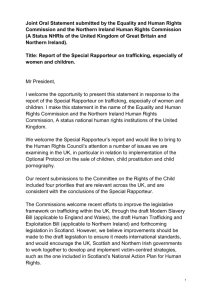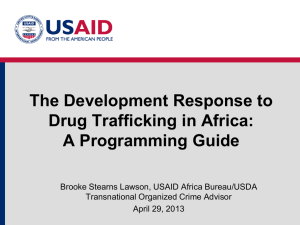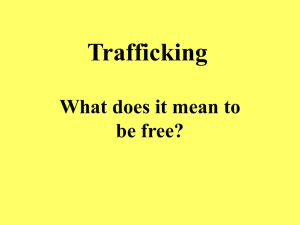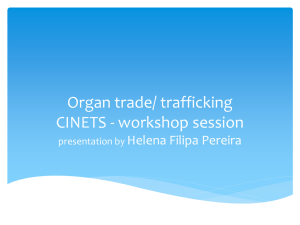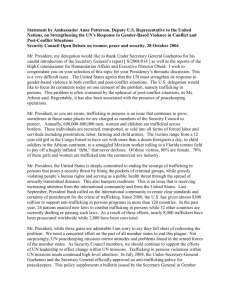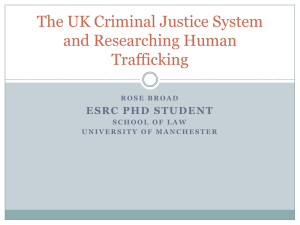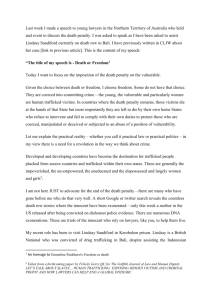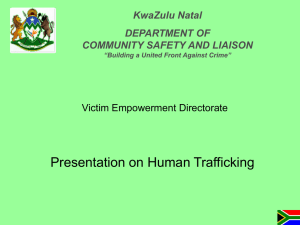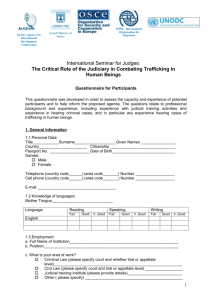To Mr - Child Centre for Children at Risk in the Baltic Sea Region
advertisement
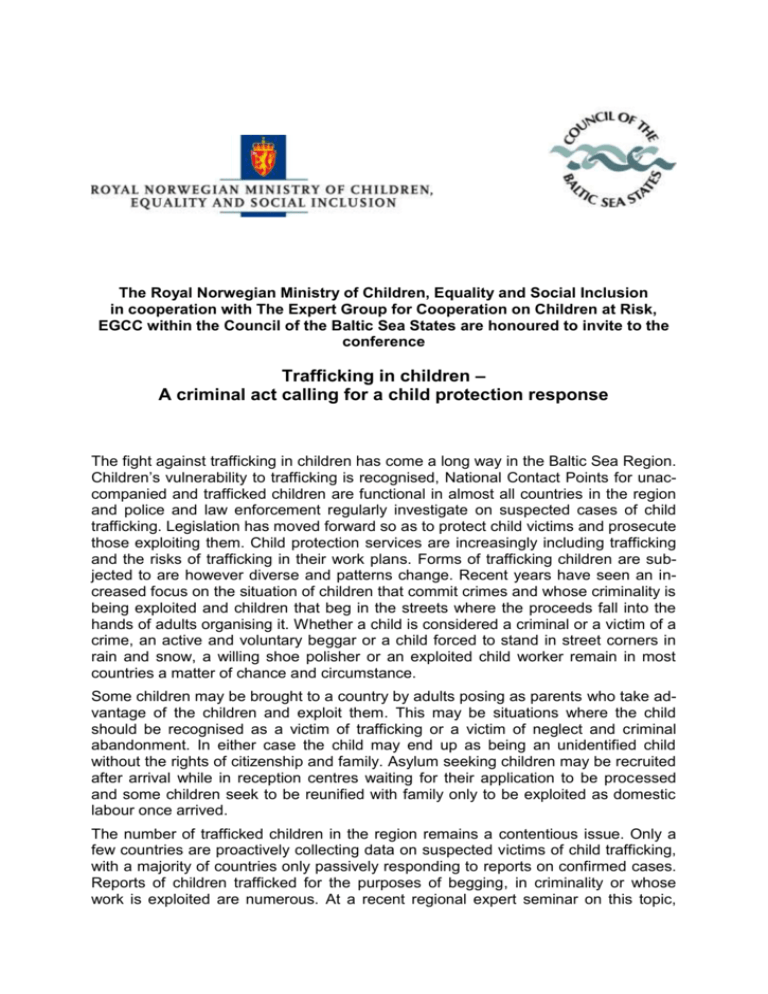
The Royal Norwegian Ministry of Children, Equality and Social Inclusion in cooperation with The Expert Group for Cooperation on Children at Risk, EGCC within the Council of the Baltic Sea States are honoured to invite to the conference Trafficking in children – A criminal act calling for a child protection response The fight against trafficking in children has come a long way in the Baltic Sea Region. Children’s vulnerability to trafficking is recognised, National Contact Points for unaccompanied and trafficked children are functional in almost all countries in the region and police and law enforcement regularly investigate on suspected cases of child trafficking. Legislation has moved forward so as to protect child victims and prosecute those exploiting them. Child protection services are increasingly including trafficking and the risks of trafficking in their work plans. Forms of trafficking children are subjected to are however diverse and patterns change. Recent years have seen an increased focus on the situation of children that commit crimes and whose criminality is being exploited and children that beg in the streets where the proceeds fall into the hands of adults organising it. Whether a child is considered a criminal or a victim of a crime, an active and voluntary beggar or a child forced to stand in street corners in rain and snow, a willing shoe polisher or an exploited child worker remain in most countries a matter of chance and circumstance. Some children may be brought to a country by adults posing as parents who take advantage of the children and exploit them. This may be situations where the child should be recognised as a victim of trafficking or a victim of neglect and criminal abandonment. In either case the child may end up as being an unidentified child without the rights of citizenship and family. Asylum seeking children may be recruited after arrival while in reception centres waiting for their application to be processed and some children seek to be reunified with family only to be exploited as domestic labour once arrived. The number of trafficked children in the region remains a contentious issue. Only a few countries are proactively collecting data on suspected victims of child trafficking, with a majority of countries only passively responding to reports on confirmed cases. Reports of children trafficked for the purposes of begging, in criminality or whose work is exploited are numerous. At a recent regional expert seminar on this topic, representatives of law enforcement and of child protection reported that it is a contentious issue if this kind of exploitation is best dealt with as a form of trafficking or if other child protection measures are considered better suited to address this form of violation of the child’s rights. The challenge is how to make trafficking a child protection measure, not just a criminal act. Information on children at risk of exploitation is an important tool in the regional cooperation preventing child trafficking. Through the project Information Management to Prevent Trafficking, financed by the EU Daphne III programme, available information and its management in the region has been explored. The result of the project focuses on how information bearers and information disseminators Ensuring a high level of preventive actions will necessitate further use of knowledge from all actors meeting with children and the EGCC will continue to promote building of sustainable information management structures nationally and in the region. Programme: The programme will consist of presentations made by law enforcement and child protection detailing actions in relation to children that are suspected to be victims of trafficking and challenges the investigations encounter. The draft programme is attached to this invitation. Participants: At the conference researchers, policy makers, law enforcement professionals and child protection specialists will have a chance to report on the most recent developments in this field and good practices will be explored in order for shared learning. Language: The conference language is English. Time: The conference will start with lunch on the 20th of June and will finish after lunch on the 21st. Directly after the conference the National Contact Points and the National Coordinators within the Baltic Sea Regional cooperation will meet. Venue: The conference will take place at Voksenåsen hotel http://www.voksenaasen.no/en/ where accommodation for the conference delegates has been arranged. Voksenåsen hotel is situated some 20 minutes from Oslo city centre, close to the famous Holmenkollen ski jump arena. The venue offers a spectacular view of Oslo and a friendly environment providing the perfect setting for the conference discussions. Practical notes: Participants will be accommodated at Voksenåsen courtesy of the Norwegian Ministry of Children, Equality and Social Inclusion. In some cases also costs for return travel to Oslo may be covered. If you would want to apply for this, please contact the Children’s Unit at the Council of the Baltic Sea States, contact details below. Registration: Please register for the conference at your earliest convenience by sending the registration form below to the Children’s Unit at the secretariat of the Council of the Baltic Sea States, P.O Box 2010, SE-103 11 Stockholm, Sweden. Fax: +46 8 440 19 44 or Email: lars.loof@cbss.org. Please include in your registration any dietary requirements you may have. Additional information: The Head of Children’s Unit, Lars Lööf, tel: +46 8 440 19 24, mail: lars.loof@cbss.org will answer any questions you may have regarding the meeting. Welcome to Oslo! On behalf of the Conference organising group Yours sincerely, Lars Lööf Head of Children’s Unit
